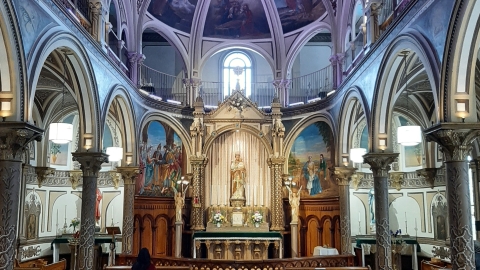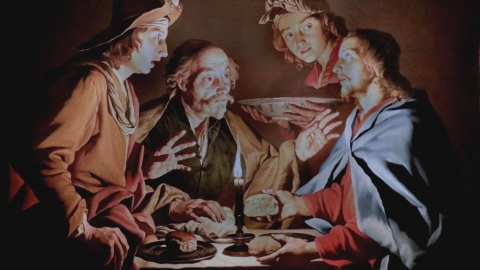Archbishop Viganò Goes Back to the Conciliar Causes of the Crisis

Le Vatican dans l’obscurité
On the occasion of the coronavirus pandemic, Archbishop Carlo Maria Viganò, former apostolic nuncio to the United States, gave several interviews during which he did not hesitate to question the conciliar errors, as he has courageously done for several months already. Far from merely seeing dramatic effects, the Roman prelate goes back to the causes and denounces ecumenism, the new liturgy, openness to the world, and episcopal collegiality.
Ecumenism Does Not Please God
On April 7, 2020, answering questions from Vaticanist Aldo Maria Valli, Bishop Viganò took issue with the ecumenism promoted by Vatican II: “If this irreverence [of the pope considering Mary’s title of co-redemptrix as ‘nonsense’ December 2019] stems from the desire to please heretics, this is an aggravating circumstance, not an excuse; indeed, I would say that if ecumenism involves dishonoring the Virgin and silencing Catholic truths to please those who are wrong, we have further evidence that ecumenism is not pleasing to God.”
“There is another aspect I would like to emphasize: the denial of dogmas and theological truths, even those that are not solemnly defined, implies an extremely destructive consequence, because the Truth—which is God Himself—cannot have parts that could be sacrificed. If one touches on a seemingly marginal dogma in relation to Trinitarian or Christological dogmas, one touches on the whole doctrinal edifice. And let me remind you that in addition to the horrors of Marian interbreeding [on December 12, the pope had also considered the Virgin Mary to be a “half-breed”], we also heard misconceptions about the very divinity of Christ, surreptitiously insinuated by interviews with a notoriously anti-Catholic newspaper [to Eugenio Scalfari, founder of La Repubblica].”
“As for the accursed Pachamama, it is clear that a gradual replacement of the Mother of God by Mother Earth is underway, out of respect for the globalist and ecological religion. Let them be very careful when they mock the Virgin: the offenses that Our Lord forgives when they are addressed to Him, He does not forgive if they have His Most Holy Mother as their object.”
In the same interview, Archbishop Viganò denounces the new liturgy and communion in the hand: “And we must also understand that the deprivation of the sacraments and Mass throughout the world is an additional punishment for our infidelity, for the sacrileges that are practiced daily in our churches by the indifference of so many ministers of God, for the desecration resulting from communion in the hand, for the lack of care in the celebrations. The serene and pure voice of the liturgy has been replaced by the vulgar and profane clamor. How can we hope that our prayer will be pleasing to Heaven?”
The Third Secret of Fatima
On April 21, Bishop Viganò gave an interview to the Portuguese site Dies Iræ where he mentioned the third secret of Fatima and related it to the Second Vatican Council: “Those who have read the third secret have clearly stated that its content concerns the apostasy of the men of the Church, which began precisely in the early 1960s and has reached such an obvious stage today that it can be recognized by lay observers. This almost obsessive insistence on subjects that the Church has always condemned, such as religious relativism and indifferentism, false ecumenism, Malthusian ecology, homo-heresy, and immigration, found in the Declaration of Abu Dhabi, fulfill a plan devised by secret sects more than two centuries ago.”
Asked about the recent creation of a commission to study the question of female deacons, Archbishop Viganò replied: “Holy Orders cannot and can never be changed in its essence. Attacks on the priesthood have always been at the center of the action of the heretics and their inspiration, and it is understandable that this is so: harming the priesthood means destroying the Holy Mass and the Holy Eucharist as well as the whole sacramental edifice. Among the sworn enemies of Holy Orders, of course, the modernists were not to be outdone—they who, since the 19th century, have speculated on a Church without priests, or with priests and priestesses. These illusions, anticipated by certain representatives of modernism in France, arose subtly at the Council, with the attempt to insinuate that there is a certain equivalence between the ministerial priesthood, resulting from Holy Orders, and the common priesthood of the faithful, coming from baptism. It is significant that, precisely by playing on this sought-after misunderstanding, the reform of the liturgy was also affected by the doctrinal error of Lumen Gentium, reducing the ordained minister to being only the simple president of an assembly. On the contrary, the priest is an alter Christus, not by popular designation, but by ontological configuration to the High Priest, Jesus Christ, whom he must imitate by the holiness of his life and absolute devotion, also represented by celibacy.”
And to point the finger at a so-called pastoral opportunism: “this [new] approach to the dogmas of the Church confirms an undeniable fact: Pope Bergoglio adopted the so-called situation theology, according to which theological places are facts or accidental matters: the world, nature, the female figure, young people ... This theology is not based on the immutable and eternal truth of God, but, on the contrary, starts from the realization of a constraining urgency of the phenomena [of society] to offer answers that meet the expectations of the contemporary world.”
Further, the former apostolic nuncio denounces the alignment of the Church with contemporary globalism, made possible by the opening to the modern world advocated by the Second Vatican Council. He thus sees the present Church “constituting itself as the spiritual arm of the new World Order and the defender of the Universal Religion. In this sense, the conciliar revolution first had to demolish the heritage of the Church, her millennial Tradition—from which she was drawing her own vitality and authority as the Mystical Body of Christ,—then get rid of the representatives of the old hierarchy, and has only recently begun to present itself, without pretense, as it seeks to be.”
To the very direct question: “What points of Vatican II would you question?” Archbishop Viganò replied in encouraging forgetting the Council altogether: “I think there is no lack of eminent personalities who have shown the problematic points of the Council better than I can. Some believe that it would be less complicated and certainly smarter to follow the practice of the Church and the Popes as it was applied with the Synod of Pistoia: even there, there was something good, but the errors that it maintained were considered sufficient to all it to fall into oblivion.”—Let us recall, however, that the diocesan synod of Pistoia (1786) where the Jansenist and Josephite theses were developed, was the subject of a precise and argued condemnation on the part of Pope Pius VI in the bull Auctorem Fidei of August 28, 1794.
At the end of the interview, the Roman prelate gives reasons and means for keeping hope: “The Church will shine again with the glory of her Lord after this terrible and very long Easter Triduum. But while prayer is certainly essential, we must not refrain from fighting the good fight, by witnessing a courageous militancy under the banner of the Cross of Christ…Let us not be intimidated! Let us not allow the gag of tolerance to be put on those who want to proclaim the Truth! Let us ask the Virgin Mary that our language courageously proclaims the Kingdom of God and His justice.”
Collegiality Dissolves the Authority of Bishops
On April 29, Archbishop Viganò granted an interview to the Vaticanist Marco Tosatti. He denounced the collegiality responsible for the silence of many bishops whose authority over their respective dioceses has been dissolved within the Italian Episcopal Conference (CEI):
Question: Many of the faithful and priests feel abandoned and uncared for by the Italian Bishops’ Conference and by the Bishops [faced with the government ban on public masses].
Answer: “It should be clarified, in order to avoid misunderstandings, that the Bishops’ Conference does not have any authority over the Bishops, who each have full jurisdiction in their own diocese, in union with the Apostolic See. And this is even more important once we have understood that the CEI has been all too amenable to – or rather, dominated by – the Italian Government.”
“Bishops should not wait for an entity without any jurisdiction to tell them what to do: it is up to each of them to decide how to act, with prudence and wisdom, in order to guarantee the Sacraments and the celebration of the Mass to the faithful. And each one can do so without having to ask either the Bishops’ Conference or the state, whose authority ends at the entrance of our churches and must stop there.”
“It is unheard of the Italian Bishops’ Conference would continue to tolerate such abuse, which prejudices the divine right of the Church, violates a law of the State, and creates a very serious precedent. And I believe that the statement issued on Sunday evening [April 26] is a proof of the consensus of the leadership of the Italian episcopate not only about the means but also about the ends this Government proposes.”
“The supine silence of the CEI, and of almost all of the individual Ordinaries, reveals that this is a situation of subordination to the State that has no precedent, and that has rightly been perceived by the faithful and by priests as a situation in which they have been abandoned to themselves. The most emblematic examples have been the scandalous interruptions of the celebration of Mass by law enforcement, with a sacrilegious arrogance that should have received an immediate and very strong protest from the Secretariat of State. The Ambassador of Italy should have been summoned to the Holy See and presented with a harsh note of protest against the government’s serious violation of the Concordat, and the Holy See should have informed the Italian government that it would exercise its right to withdraw the Apostolic Nuncio to Italy if the government’s illegitimate provision was not withdrawn.”
And Bishop Viganò addresses his colleagues in the episcopate directly: “Do not allow the freedoms of the Church to be limited by the excuse of an alleged epidemic! [The assertion of a “supposed epidemic” is the author’s opinion. Editor’s note] Do not allow it either by the State or by the CEI! The Lord will ask you to give an account for the souls who die without the Sacraments, for sinners who have not been able to reconcile with Him, for the fact that you made it so that, for the first time since the Edict of Constantine [in 313], the faithful were prohibited from worthily celebrating Easter. Your priests are not fearful: they are heroic witnesses, and they are suffering from the arbitrary orders you have given them. Your faithful are imploring you: do not remain deaf to their cry!”
Question: These are words that seem to invite disobedience to ecclesiastical authority even before civil authority.
Answer: “Obedience is ordered to the Truth and to the Good, otherwise it is servility. We have arrived at such a dulling of conscience that we no longer realize what ‘giving witness to the Truth’ means: do we think that Our Lord will judge us on having been obedient to Caesar, when this means disobeying God? Is the Christian not bound to conscientious objection, even at work, when that which is asked of him violates the Divine Law? If our faith was based only on obedience, the martyrs would not have had to face the torment to which the civil law condemned them: it would have been enough to obey and burn a grain of incense before the statue of the Emperor.”
To the accusation of being “divisive,” Archbishop Viganò replied: “Unity in Faith and in Charity is based on the salvation of souls, not in their harm: the ‘talks’ given by the CEI are insufficient, as are the smiling papal meetings with the Prime Minster in which he has been given an indulgent cooperation that reveals conniving and collaboration. Proclaiming the truth is necessarily ‘divisive,’ because the truth opposes error just as the light opposes the darkness. Thus the Lord has said to us: “Do you think that I have come to bring peace to the earth? No, I tell you, but division’ (Lk 12:51).”
(Sources : A.M. Valli/Dies Iræ/M. Tosatti/DICI – trad. à partir de benoitetmoi et de J. Smits – FSSPX.Actualités - 30/05/2020)



